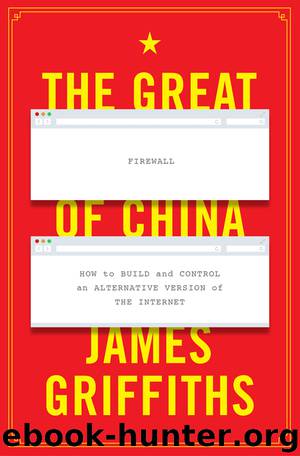The Great Firewall of China by James Griffiths;

Author:James Griffiths;
Language: eng
Format: epub
Publisher: Book Network Int'l Limited trading as NBN International (NBNi)
Published: 2018-06-15T16:00:00+00:00
Chapter 19
Root and stem
The internet is more vulnerable than you think
In September 2017, I drove to the Chinese University of Hong Kong (CUHK), my Uber blasting K-pop and almost getting lost in the maze-like campus. CUHK sits nestled on a tree-covered hilltop in the shadow of Tai Mo Shan, the city’s highest peak, overlooking Tolo Harbour and the sprawling Sha Tin New Town, one of a handful of satellite settlements built north of Hong Kong proper to house the city’s ever-expanding population. Quiet, spacious, green and pedestrian-friendly, the campus is a world apart from Hong Kong Island or Kowloon. On that day, it was bathed in sunlight, with a cool breeze cutting through the stifling late summer temperature.
CUHK is also home to the Hong Kong Internet Exchange (HKIX), one of hundreds of such institutions around the world that quietly and largely invisibly ensure that the internet functions as it does. As Kenneth Lo, an HKIX systems engineer, explained to me in a sparse conference room inside the company’s hillside office, an exchange functions similarly to a home internet router, just on a much larger scale.1 As your home router allows devices on your network – phones, games consoles, laptops – to communicate with each and connect to the internet, so an internet exchange handles routing requests between various internet service providers (ISPs) and the internet backbone. The shorter the distance requests have to travel, the faster websites will load, so by keeping traffic within a certain geographic area as much as possible, internet exchanges are able to boost speeds and make things more efficient for users. Another HKIX engineer used the example of a highways department: just as local governments look to relieve congestion by building new roads and links to other cities, the internet exchange ensures that users are able to connect to servers as fast and cleanly as possible.
After a crash course in internet exchanges, Lo and his colleagues took me to what I had come to see. A ten-minute drive across campus at another featureless, grey building off a narrow street packed with parked cars, Lo swiped us through a security gate and we walked inside. At a checkpoint, I wrote down my name and phone number, and in return received a temporary pass to clip on my shirt: number 111.
Lo entered another code to unlock the door beyond the security desk and we were met by a blast of cold and the noise of several air-conditioning units working overtime. Long, tall rows of server stacks filled the room, standing atop squares of carpet that looked like a collection of free samples from the most boring textile shop in the world. Above the server stacks, wire baskets hung from the ceiling, filled with wads of yellow and blue cables bound together with tape. Lo led me along a couple of rows of servers before stopping before one that looked identical to the others, opening its door, and gesturing inside. “There it is,” he said.
Several rows of servers
Download
This site does not store any files on its server. We only index and link to content provided by other sites. Please contact the content providers to delete copyright contents if any and email us, we'll remove relevant links or contents immediately.
| Arms Control | Diplomacy |
| Security | Trades & Tariffs |
| Treaties | African |
| Asian | Australian & Oceanian |
| Canadian | Caribbean & Latin American |
| European | Middle Eastern |
| Russian & Former Soviet Union |
The Secret History by Donna Tartt(18175)
The Social Justice Warrior Handbook by Lisa De Pasquale(11956)
Thirteen Reasons Why by Jay Asher(8459)
This Is How You Lose Her by Junot Diaz(6444)
Weapons of Math Destruction by Cathy O'Neil(5837)
Zero to One by Peter Thiel(5496)
Beartown by Fredrik Backman(5366)
The Myth of the Strong Leader by Archie Brown(5242)
The Fire Next Time by James Baldwin(5022)
How Democracies Die by Steven Levitsky & Daniel Ziblatt(4965)
Promise Me, Dad by Joe Biden(4909)
Stone's Rules by Roger Stone(4865)
100 Deadly Skills by Clint Emerson(4694)
A Higher Loyalty: Truth, Lies, and Leadership by James Comey(4554)
Rise and Kill First by Ronen Bergman(4547)
Secrecy World by Jake Bernstein(4392)
The David Icke Guide to the Global Conspiracy (and how to end it) by David Icke(4385)
The Farm by Tom Rob Smith(4328)
The Doomsday Machine by Daniel Ellsberg(4249)
